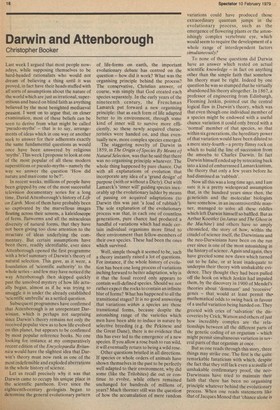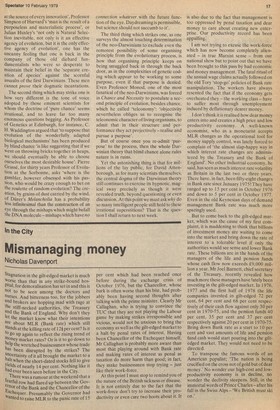Darwin and Attenborough
Christopher Booker
Last week I argued that most people nowadays, while supposing themselves to be hard-headed rationalists who would not dream of believing a thing until it was proved, in fact have their heads stuffed with all sorts of assumptions about the nature of the world which are just as irrational, superstitious and based on blind faith as anything believed by the most benighted mediaeval peasant. I went on to argue that, on closer examination, most of these beliefs can be seen to derive from what might be called 'pseudo-myths' — that is to say, arrangements of ideas which in one way or another seek to answer for their adherents exactly the same fundamental questions as would once have been answered by religious 'myths'. This week I proposse to look at one of the most popular of all these modern superstitions or pseudo-myths — namely the way we answer the question 'How did nature and man come to be?'.
In recent weeks, millions of people have been gripped by one of the most successful television documentary series for a long time, David Attenborough's history of Life on Earth. Most of them have probably been so captivated by the marvellous images floating across their screens, a kaleidoscope of ferns, flatworms and all the miraculous diversity of natural forms, that they have not been giving too close attention to the structure of ideas underlying the commentary. But certain assumptions have been there, readily identifiable, ever since Attenborough opened the first programme with a brief summary of Darwin's theory of natural selection. This gave, as it were, a foundation of 'scientific authority' to the whole series —and few may have noticed the way Attenborough then skipped quickly past the unsolved mystery of how life actually began, almost as if he was trying to smuggle it in under the already established 'scientific umbrella' as a settled question.
Subsequent programmes have confirmed that Attenborough is an unrepentant Darwinian, which is perhaps not surprising since Darwin's theory remains not only the received popular view as to how life evolved on this planet, but appears to be confirmed by most popular reference books. No one looking for instance at my comparatively recent edition of the Encyclopaedia Britannica would have the slightest idea that Darwin's theory must now rank as one of the most indefensible and exploded aberrations in the whole history of science.
Let us recall precisely why it was that Darwin came to occupy his unique place in the scientific pantheon. Ever since the eighteenth-century geologists began to determine the general evolutionary pattern of life-forms on earth, the important evolutionary debate has centred on the question — how did it work? What was the organising principle behind the process? The conservative, Christian answer, of course, was simply that God created each species separately. In the early years of the nineteenth century, the Frenchman Lamarck put forward a new organising principle: that as each form of life adapted better to its environment, through some kind of inner will to survive more efficiently, so these newly acquired characteristics were handed on, and thus eventually new. more complex species emerged.
The staggering novelty of Darwin in 1859. in The Origin of Species By Means of Natural Selection, was that he said that there was no organising principle whatever. The whole thing happened by pure chance. Out with all explanations of evolution that incorporate any idea of a 'grand design' of purpose (with or without a Diety). Out with Lamarck's 'inner will' guiding species inexorably up the evolutionary ladder by means of passing on acquired adaptations (to Darwin this was just 'a load of rubbish'). The sole explanation of the evolutionary process was that, in each one of countless generations, pure chance had produced a handful of variations which had made certain individual organisms more fitted to their environment than fellow-members of their own species. These had been the ones which survived.
Well, simple though it seemed to be, such a theory instantly raised a lot of questions. For instance, if the whole history of evolution has been one long process of variations inching forward to better adaptation, why is it that the fossil record only appears to contain well-defined species. Should we not rather expect the rocks to contain an infinite blur of forms? What has happened to all the transitional stages? It is no good answering that variations within a species are those transitional forms, because despite the astonishing range of the varieties which men have been able to induce in nature by selective breeding (e.g. the Pekinese and the Great Dane), there is no evidence that this has ever led to the emergence of a new species. If you allow a rose bush to run wild, it will eventually return to being a wild rose.
Other questions bristled in all directions. If species or whole orders of animals have shown themselves in the past to be perfectly well adapted to their environment, why did some (like the Trilobites) die out or continue to evolve, while others remained unchanged for hundreds of millions of.,, years? Much thornier still was the questionof how the accumulation of mere random variations could have produced those extraordinary quantum jumps in the evolutionary process, such as the emergence of flowering plants or the astonishingly complex vertebrate eye, which would seem to require the development of a whole range of interdependent factors simultaneously?
To none of these questions did Darwin have an answer which rested on actual scientific knowledge — in fact on anything other than the simple faith that somehow his theory must be right. Indeed by one question he was so stumped that he virtually abandoned his theory altogether. In 1867, a professor of engineering from Edinburgh, Fleeming Jenkin, pointed out the central logical flaw in Darwin's theory, which was that even though one individual member of a species might be endowed with a useful chance variation it could only breed with a 'normal' member of that species, so that within six generations, the hereditary power of that variation would have been diluted to a mere sixty-fourth — a pretty flimsy rock on which to build the line of succession from the amoeba to Charles Darwin. In fact Darwin himself ended up by retreating back into a kind of embarrassed Lamarckianism, the theory that only a few years before he had dismissed as 'rubbish'.
Now all this was a long time ago, and I am sure it is a pretty widespread assumption that, in the hundred years since then, the neticists and the molecular biologists have somehow, in an incontrovertible manner, managed to solve all these riddles which left Darwin himself so baffled. But as Arthur Koestler (in Janus and The Ghost in the Machine) and others have so amply chronicled, the story of how, within the citadel of science itself, the Darwinians and the neo-Darwinians have been on the run ever since is one of the most astonishing in the history of science. Again and again, they have greeted some new dawn which turned out to be false, or at least inadequate to underpin their theory with unshakable evidence. They thought they had been pulled off the hook on which Jenkin had impaled them, by the discovery in 1900 of Mendel's theories about 'dominant' and 'recessive' genes — that would at least permit the mathematical odds to swing back in favour of a useful variation being handed on. They greeted with cries of 'salvation' the discoveries by Crick, Watson and others of just how incredibly complex are the relationships between all the different parts of the genetic coding of an organism — which might permit simultaneous variation in several parts of that organism at once.
But as one reads through this story, three things may strike one. The first is the quite remarkable fanaticism with which, despite the fact that they still lack even a scintilla of unshakable confirmatory proof, the neoDarwinians have tried to maintain their faith that there has been no organising principle whatever behind the evolutionary process. When one reads statements like that of Jacques Monod that 'chance alone is at the source of every innovation', Professor Simpson of Harvard's 'man is the result of a purposeless and materialistic process', or Julian Huxley's 'not only is Natural Selection inevitable, not only is it an effective agency of evolution, but it is the only effective agency of evolution', one has the uncanny feeling that one is back in the company of those old diehard fundamentalists who were so desperate to maintain their belief in the 'separate creation of species' against the scornful assaults of the first Darwinians. These men cannot prove their dogmatic incantations.
The second thing which may strike one is how very different is the tone of voice adopted by those eminent scientists for whom the doctrine of 'pure chance' seems irrational, and to leave far too many enormous questions begging. As Professor of Genetics at Edinburgh, for instance, C. H. Waddington argued that `to suppose that evolution of the wonderfully adapted biological mechanisms' has been produced by blind chance 'is like suggesting that if we went on throwing bricks together in heaps, we should eventually be able to choose ourselves the most desirable house'. Pierre Grasse', for thirty years Professor of Evolution at the Sorbonne, asks 'where is the gambler, however obsessed with his passion, who would be crazy enough to bet on the roulette of random evolution? The creation, by grains of dust carried by the wind, of Dilrer's Melancholia has a probability less infinitesimal than the construction of an eye through the mishaps which might befall the DNA molecule — mishaps which have no connection whatever with the future function of the eye. Daydreaming is permissible, but science should not succumb to it'.
The third thing which strikes one, as one surveys the almost touching determination of the neo-Darwinians to exclude even the remotest possibility of some organising principle from the evolutionary process, is how that organising principle keeps on being smuggled back in through the back door, as in the complexities of genetic coding which appear to be working to some purpose, even if that purpose is denied. Even Professor Monod, one of the most fanatical of the neo-Darwinians, was forced in Chance and Necessity to postulate a second principle of evolution, besides chance, which he called 'teleonomy': 'objectivity nevertheless obliges us to recognise the teleonomic character of living organisms, to admit that in their structure and performance they act projectively — realise and pursue a purpose'.
But of course once you re-admit 'purpose' to the process, then the whole Darwinian theory that blind chance alone rules nature is in ruins.
Yet the astonishing thing is that for millions of the lay public, for David Attenborough, as for many scientists themselves, the central dogma of the Darwinian theory still continues to exercise its hypnotic, magical sway precisely as though it were revealed truth, beyond questioning or even discussion. At this point we must ask why do so many intelligent people still hold to these irrational superstitions? That is the question I shall return to next week.



































 Previous page
Previous page